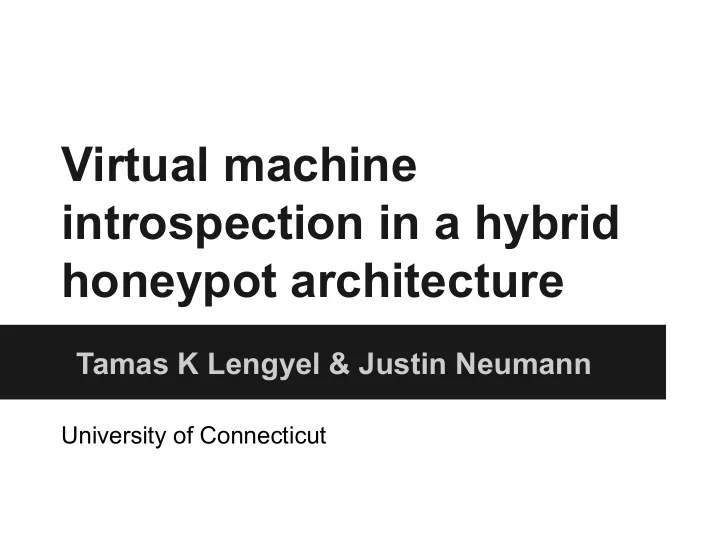

Virtual machine introspection in a hybrid honeypot architecture Tamas K Lengyel & Justin Neumann University of Connecticut
The role of the honeypot
The limitations Low-interaction honeypots: • "Artificial" attack surface • Limited information about the attacks High-interaction honeypots: • Complexity • Maintenance • High risk
Hybrid honeypots Theory: Combining low and high interaction honeypots can provide the best of the two. Original idea: switch an attack to a high-interaction honeypot based on predefined rules Problem: What rules? Robin Berthier, 2006: Advanced honeypot architecture for network threats quantification
Further problems Few choices for high-interaction honeypots • Sebek • Qebek • Argos Why? " Regarding Reviewer #4’s question as to whether we would consider releasing gateway and containment server code to the community, we indeed considered this. However, in our experience malware execution platforms differ substantially, and it would likely be hard to make our code work in a variety of environments. In addition, we lack the support to commit to the maintenance necessary for such a public release to be effective . " Kreibich et. al., SIGCOMM 2011: GQ: Practical Containment for Measuring Modern Malware Systems
Further problems Virtualization based honeypots: • Modified QEMU • Malware can detect monitoring and alter its behaviour • Most only work with Windows XP SP2
VMI-Honeymon http://vmi-honeymon.sf.net • Built on open source tools • • • • • LibVMI LibVirt LibGuestFS Volatility Xen • Full virtualization, no modification to Xen • Works with all versions of Windows with no in-guest agent • Read-only memory scanning and footprinting eliminates subversion attacks
System overview • Honeybrid filters attackers who already dropped payload on Dionaea • Only one attacker interacts with the HIH at a time • An attack is transferred to the HIH when it is free (random samples)
System overview • Honeybrid detects outgoing connections from HIH, sends trigger to VMI- Honeymon • On time-out Honeybrid sends trigger to VMI- Honeymon • After attack session, HIH is reverted
Results (in two weeks) VMI-Honeymon: 886 binaries (6,335 TCP sessions) Dionaea: 1,411 binaries (1,152,142 TCP sessions)
Performance
Future work • Multiple concurrent HIHs • Using Windows Vista, 7 and 8 as HIH • Fast-clone/memory sharing of HIHs • Automatic analyses of malware memory footprints to detect similarities
Thank you!
Recommend
More recommend